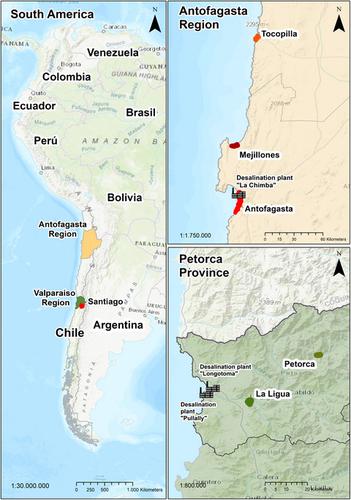当前位置:
X-MOL 学术
›
Trans. Instit. Br. Geogr.
›
论文详情
Our official English website, www.x-mol.net, welcomes your
feedback! (Note: you will need to create a separate account there.)
Desalination and the disarticulation of water resources: Stabilising the neoliberal model in Chile
Transactions of the Institute of British Geographers ( IF 3.3 ) Pub Date : 2019-11-04 , DOI: 10.1111/tran.12351 Maria Christina Fragkou 1 , Jessica Budds 2
Transactions of the Institute of British Geographers ( IF 3.3 ) Pub Date : 2019-11-04 , DOI: 10.1111/tran.12351 Maria Christina Fragkou 1 , Jessica Budds 2
Affiliation

|
In recent years, seawater desalination has become a more viable and common solution to water scarcity around the world. Desalination is a supply‐led solution in that it produces additional water, rather than manages demand for existing resources. Although a growing body of work has analysed the environmental and social implications of desalination, desalinated water has to date been considered as an additional source that fulfils demand, with little attention to how it integrates with existing sources, and to what effect(s). In this paper, we employ the framework of the hydrosocial cycle to analyse how desalination reconfigures the social relations of control over water and reworks waterscapes in Chile. Using two case studies of Antofagasta and Petorca in the drought‐affected north, which are dominated by export industries – mining and agriculture, respectively – we argue that desalination serves to disarticulate drinking water from freshwater, with implications for economic growth, social development, and water policy. We show that desalination entails more than providing additional water to alleviate shortages, and rather constitutes a strategy that permits the reorganisation of water sources so as to permit new forms of capital accumulation, through both the water industry as well as the major industries that are threatened by scarcity. We argue that this has three important implications. First, replacing freshwater with desalinated water for human consumption changes the social relations of control over water, by rendering consumers dependent on desalination plants and their risks. Second, this disarticulation serves to liberate freshwater to sustain the same industries that encroached on drinking water sources. Third, as a supply‐led solution, desalination alleviates some of the water shortages that had been attributed to Chile's water markets model, thereby reducing pressure for reform.
中文翻译:

海水淡化和水资源分离:稳定智利的新自由主义模式
近年来,海水淡化已成为解决全球缺水问题的更可行,更普遍的解决方案。海水淡化是一种以供应为导向的解决方案,因为它会产生更多的水,而不是管理对现有资源的需求。尽管越来越多的工作已经分析了海水淡化对环境和社会的影响,但迄今为止,海水淡化已被视为满足需求的额外水源,很少关注其与现有水源的整合方式和效果。在本文中,我们采用水社会循环的框架来分析海水淡化如何重新构造智利水控制的社会关系并重塑水景。利用受干旱影响的北部的安托法加斯塔(Antofagasta)和佩托卡(Petorca)的两个案例研究,这些案例以出口行业(采矿和农业)为主,我们分别认为,淡化海水可以淡化饮用水中的淡水,对经济增长,社会发展和水政策产生影响。我们表明,海水淡化不仅能提供额外的水来缓解短缺,而且还构成了一种战略,该战略允许通过水工业以及受到威胁的主要工业重组水资源,从而允许新形式的资本积累。由于稀缺。我们认为这具有三个重要含义。首先,用淡化水代替淡水供人类消费,使消费者依赖于海水淡化厂及其风险,从而改变了对水控制的社会关系。第二,这种分离有助于释放淡水,以维持与饮用水源相同的工业。第三,作为一种以供应为主导的解决方案,淡化海水可以缓解因智利的水市场模型而导致的部分水资源短缺,从而减轻改革的压力。
更新日期:2019-11-04
中文翻译:

海水淡化和水资源分离:稳定智利的新自由主义模式
近年来,海水淡化已成为解决全球缺水问题的更可行,更普遍的解决方案。海水淡化是一种以供应为导向的解决方案,因为它会产生更多的水,而不是管理对现有资源的需求。尽管越来越多的工作已经分析了海水淡化对环境和社会的影响,但迄今为止,海水淡化已被视为满足需求的额外水源,很少关注其与现有水源的整合方式和效果。在本文中,我们采用水社会循环的框架来分析海水淡化如何重新构造智利水控制的社会关系并重塑水景。利用受干旱影响的北部的安托法加斯塔(Antofagasta)和佩托卡(Petorca)的两个案例研究,这些案例以出口行业(采矿和农业)为主,我们分别认为,淡化海水可以淡化饮用水中的淡水,对经济增长,社会发展和水政策产生影响。我们表明,海水淡化不仅能提供额外的水来缓解短缺,而且还构成了一种战略,该战略允许通过水工业以及受到威胁的主要工业重组水资源,从而允许新形式的资本积累。由于稀缺。我们认为这具有三个重要含义。首先,用淡化水代替淡水供人类消费,使消费者依赖于海水淡化厂及其风险,从而改变了对水控制的社会关系。第二,这种分离有助于释放淡水,以维持与饮用水源相同的工业。第三,作为一种以供应为主导的解决方案,淡化海水可以缓解因智利的水市场模型而导致的部分水资源短缺,从而减轻改革的压力。











































 京公网安备 11010802027423号
京公网安备 11010802027423号